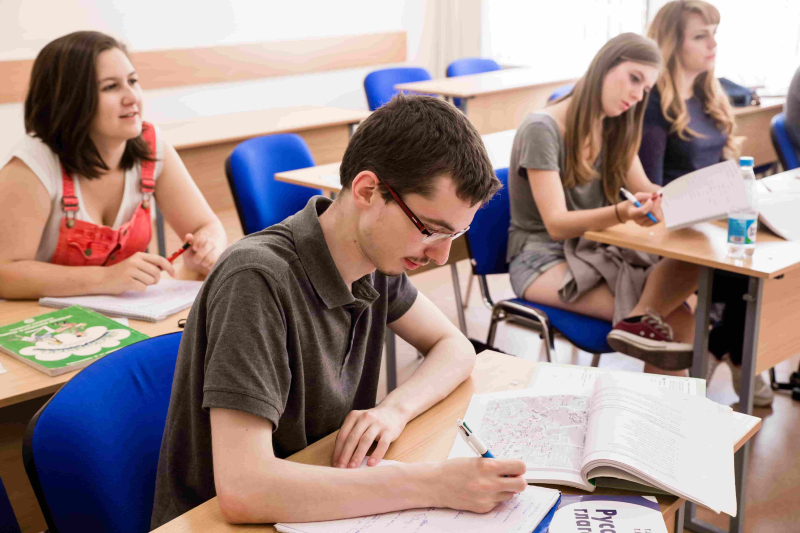Master's graduate, Business Transformation Strategies and Technologies
Preparing For a Year of Learning the Russian Language
As an international student traveling to Russia, you should be well prepared to face language barriers both in your academic and social life until you gain a certain level of proficiency. Read on to find out about how to improve your Russian language skills on a personal and professional level.

Before your arrival in Russia, make sure that you have done your research and at least know about the Russian alphabets and some basic Russian terms such as Hello [Здравствуйте], Yes [Да], No [Нет], Thank you [Спасибо], Excuse me [Извините], I don't speak Russian [Я не говорю по-русски], Do you speak English? [Вы говорите по-английски?]. You never know when these words and phrases can come to your rescue. Maybe you need help with your luggage at the airport or you simply want to go to your hotel room from the airport. By just knowing some basic terms you can easily deal with these situations.
Nowadays, we have so many apps that make our language learning easy and let us have access to the study materials at any time by just a tap of our mobile screen. Duolingo, RussianPod101, Memrise, and iTalki are some of the widely used apps that you can use to learn something new everyday. Also, you can find useful content on YouTube videos — Boost Your Russian, Be Fluent in Russian that will help you to become familiar with the Russian alphabet, vocabulary, and pronunciation.
A new language is a new life [Новый язык — это новая жизнь]
Podfak meaning preparatory faculty [подготовительный факультет] is an intensive, full-time language learning course designed specially for non-native Russian speakers to achieve the proficiency required to enroll and study in Russian-taught academic programmes, speak in Russian fluently at your workplace or just let you enjoy daily life conversations with your fellow Russian classmates, dorm staff and with anyone else who is a native Russian speaker. Once you have started with your foundation program, make sure to focus on developing a high understanding of the Russian language. This course is designed in a way that it covers not only Russian language learning in terms of reading, writing, speaking, understanding and using Russian grammar but also field specific scientific terms in engineering, social sciences, and humanitarian programs.

For the first couple of months the schedule will be very intensive. We spend about five hours in class every day five days a week. Also, at times it may be confusing — rules, exceptions, grammar cases and so much more to remember. It is also said that Russian is one of the hardest languages to learn in the world. Also, many students will face issues in pronouncing certain words such as "R" and "X" in Russian phonetics because they might not have a similar phonetic in their native language. Review and revise all that has been taught in the classroom, keep adding new words to your vocabulary, and try using those new words in your daily conversations with friends. Try to recognize alphabets, numbers and words that you may see in the newspaper, in the metro at a shopping complex. Unless you practise, you will never learn. But always remember…
"I begin by imagining
The impossible
And end by accomplishing
The impossible."― Sri Chinmoy, Sri Chinmoy's Heart Garden: A Book of Aphorisms for Joy and Inspiration
The set of techniques that I have found useful in learning a new language and building vocabulary
I always write down new words or phrases that I hear, read or see along with their English translation. This makes it a lot easier for me to remember the words and their meanings. After I have written down the new words and memorized them, I try to use them as an alternative for the English word or phrase in my daily conversation. Getting the correct pronunciation for a new word is very important. Always pronounce the word several times, you can also record what you are saying using your phone and then compare it with the audio lessons or videos to check if you are pronouncing it correctly or not. Repeating the new words will not only make it easier for you to remember them but you can also start using them. Watching a good Russian movie or a TV Series is yet another way of adding new words to your vocabulary while making sure you remember the meanings and pronunciation of the already learned words. Not only can you easily make new friends but also you can easily talk to the locals by using this simple technique.

Personally, learning a new language such as Spanish or Korean has always been inspiring to me as it has enabled me to have a basic conversation with people in their native language and overcome cultural barriers. Last year, when I was applying to foreign universities for my Master’s degree around the months of November — December I always knew that I did not just want to embark on a new adventure in life but also make my journey challenging and worth exploring. I had friends who were studying in Russian universities and who advised me to apply for a course here in Russia. It was tempting firstly because I would be able to enjoy and experience cultural differences between India and Russia and secondly learn a new language "Russian".
Thank you for reading!
